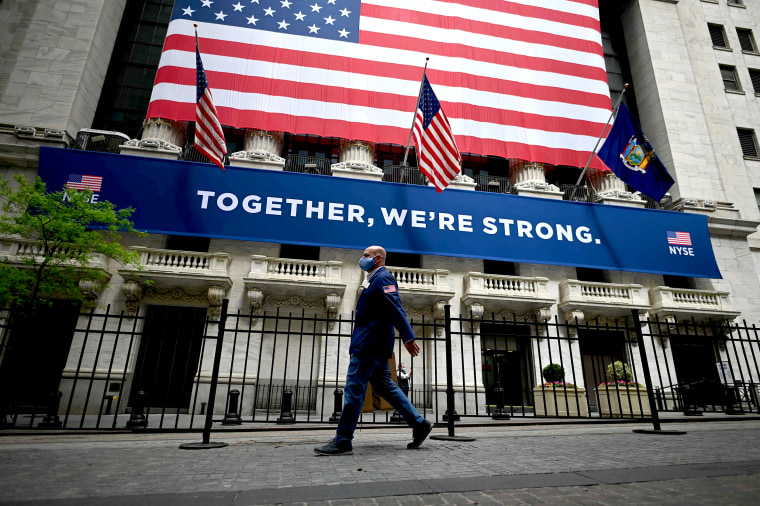The market seems to have absorbed President Donald Trump’s Covid-19 diagnosis with little incident, but experts warn that any sudden or marked changes in the president’s condition in the waning days of a bruising campaign season could prove profoundly unsettling for investors.
When Trump tweeted in the early hours of Friday morning that he had tested positive for the virus, the stock market sank, with the Dow Jones Industrial Average falling 500 points. However, the market regained some of that ground by the end of the week on the assumption that a weaker-than-expected monthly jobs report would prompt Congress to come to an agreement on a new stimulus package.
There is little precedent for what happens next for a couple of reasons. “This is uncharted, for sure,” said Lawrence White, professor of economics at New York University. “I don't think that the market cares a great deal about Donald Trump's Covid problems — so long as they do not appear to be life-threatening.”
Many past presidential health crises have had little impact on the stock market. In part, this was because earlier administrations often sought to keep evidence that the president was ill under wraps — a feat largely possible in eras when methods of communication could take days or weeks and film or televised news didn’t exist.
Even later threats to presidents’ lives, though, didn’t roil markets over the long term. “The market shrugged off the wounding of Ronald Reagan in 1981,” White said. And although the S&P dropped by nearly 3 percent the day of John F. Kennedy’s assassination, it recovered that value in just two days.
“The market has been looking through bad news for months now,” said Dan North, senior economist at Euler Hermes North America. Wall Street’s resilience reflects the forward-looking orientation of the stock market, he said. “It looks through the current day into the future.”
Trump isn’t even the first president to fall ill during a pandemic: Woodrow Wilson contracted the Spanish Flu in 1919 and was severely ill — a fact that was hidden from the general public, as was Wilson’s stroke six months later. (The 25th Amendment, which outlines protocols in the event of a president’s incapacitation, wasn’t added to the Constitution until 1967.)
When Dwight Eisenhower suffered a heart attack in 1955, the market promptly plunged by some 6 percent — costing investors about $14 billion at the time (the equivalent of $135 billion today) before regaining the value it lost over the course of months.
During his lengthy convalescence and a subsequent intestinal operation, Eisenhower’s administration adopted a more forthcoming position. “Eisenhower had a heart attack and abdominal surgery and he took a totally different approach,” North said, which included detailed daily briefings on his health. “They had transparency.”
Conflict and confusion in reports coming from Trump’s medical team, the White House and the president himself make ascertaining his true condition somewhat of a guessing game. “It's a little bit hard to know what you’re hearing from the doctors, Trump and the people around him — they’re almost certainly trying to paint a picture that’s a bit brighter than the reality of the situation,” North said.
The bigger issue is the looming election. With Election Day just four weeks away, questions are still swirling around how Trump will be able to safely campaign and debate. And, White said, should his health take a sudden turn for the worse between now and Nov. 3, investors should brace for chaos.
”If he were to be rushed back to Walter Reed, I think there would be a substantial adverse market reaction,” he said. “If he were to be more seriously stricken, then the issue of a… last-minute inability to run throws open all these cans of worms at the state level. It’s all of the uncertainty, and markets generally abhor uncertainty.”
